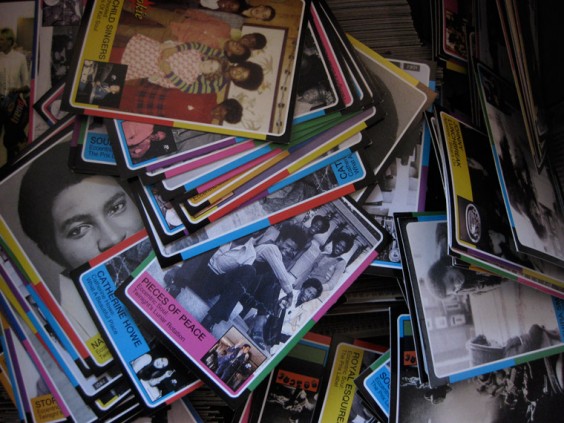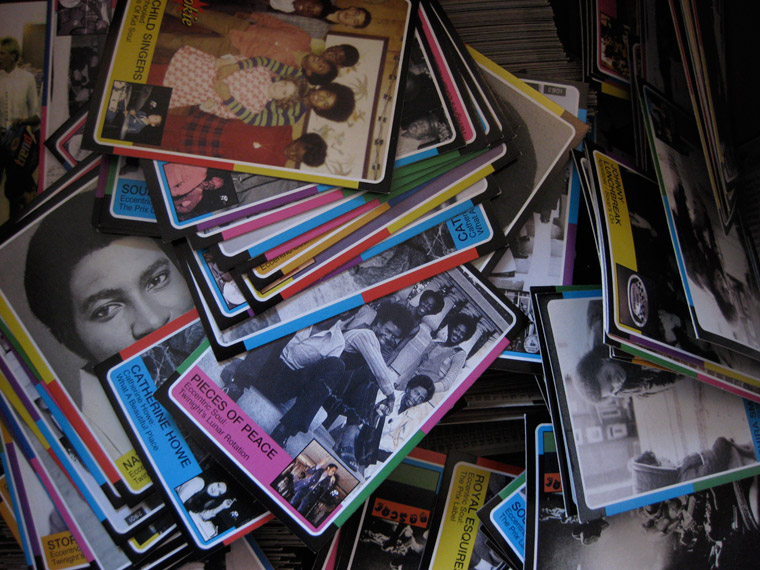
When Numero Group, a Chicago-based reissue label, opened its doors in 2003, its mission statement was clear: “We wanted to dig deep into the recesses of our record collections with the goal of finding the dustiest gems begging to be released from their exile on geek street.”
In the relatively short six years during which Numero has reissued music, founders Tom Lunt, Rob Sevier, and Ken Shipley have remained unwavering in their pedagogy.
Their catalog, now 35 albums deep, has spanned from samba-influenced Belgian pop (Antena: Camino Del Sol) to an unreleased blaxploitation soundtrack (Brotherman) to Belizean funk (Cult Cargo: Belize City Boil Up).
ALARM contributor Jeff Min caught up with Shipley to discuss the label’s MO.
Take me back to when you first started collecting records.
For me, this all really began with baseball cards and comic books, and always being obsessed with gathering things in numerical order and in complete sets of things. I guess that I actively started buying records when I was around 12; I would go to yard sales and garage sales, flea markets, and things like that.
But the idea for the label didn’t really come out of all that until having worked at Rykodisc, and seeing a bunch of other stuff that I really liked that was sort of thematically put together. What drew me to Rykodisc was how all their records had this green jewel case.
You knew what a Ryko record looked like immediately before you even knew what it was. So for me, I wanted to make records that had that same feeling all around.
Numero is a label that documents the American experience using music as its medium. Has there been a mission statement?
We always say that we make the kind of records that you didn’t know that you wanted to own. I don’t know if there’s necessarily one exact mission statement; we just make records that we would want to listen to.
And there’s no one overarching statement about what it is that we do anymore, because what we thought about in the beginning to what we think about now is not necessarily what we’ll think about in the next five years. Mostly, we just look for records that we think are really great and that people should hear, and we try to make records that have an interesting story along with it.
A lot of record companies out there will gladly make a record of singles that they think are great, but the accompanying notes or information don’t quite stack up to the music, and you’re kind of left with one half of the package. And that’s why we don’t like compilations like “fourteen funky 45s” — we try to make something thematic or a label or a scene.
It’s notable to see how Numero has documented various music scenes. How difficult is it to decide what to include and what not to?
It all depends on what we’re working on, but I’ll say this: when we sit down to make a record, a lot of times it’s just an idea and there’s this label or genre or this artist. And generally, when we make a compilation, we just want the cream; we want the stuff that’s most interesting to us and that says something or defines a genre to a perfect extent.
Whenever we sit down to sequence things, we always say that it’s like making a mixtape for someone, and if you’re going to make a mixtape with these 18 songs, what order to you put them in?
I’ve always made records where the first song is going to make you want to listen to the second song. The last song on side A should make you want to turn it over and listen to side B, and the last song on side B should make you want to listen to the thing all over again.
When you approach these artists and ask them to unearth pieces of their past, what sort of ethical approach do you take? They have to be excited, but I imagine at the same time that you’re asking them to resurrect some tragic tales.
Everyone is different. You take on a different approach based on their level of enthusiasm. Some people are enthusiastic, but they really don’t care; they just want their check. Others want to talk for hours, and they become people that you talk to almost every day.
It just takes a lot of time and energy to get to that point. Some records almost come together instantaneously; you make a call and all of a sudden you got a license, and you’re done. Other records take years — trying to convince someone that they should be working with you.
We’re working with people that have been tapped ten times before we got there, but it was this eleventh time with the right combination of finesse that makes it happen.
People want to be heard and they want to believe that you care about them — that you care about their story and their words. And if you can do that and really connect with the artist, you can have a great relationship for years to come.
– Jeff Min

